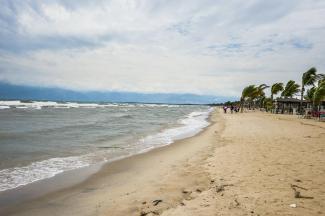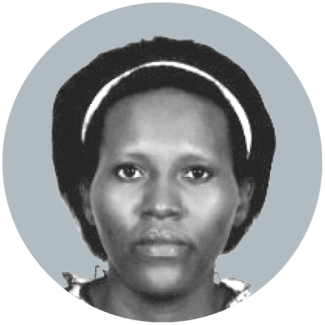Global heating
Lake Tanganyika: levees needed

According to official statistics, 44,000 Burundians were forced to leave their homes because of climate-induced events in 2020. In 2021, another 35,000 people were displaced. About 90 % stayed in the country. Government offices report that the main reasons were flooding on the shores of Lake Tanganyika, Africa’s second largest lake (see a previous contribution of mine on www.dandc.eu), as well as those of the Rusizi River, which flows into it. The provinces of Bujumbura, Rumonge und Makamba were affected in particular.
Though the internally displaced persons (IDPs) are given food, they live in precarious circumstances. They need shelter. The International Organization for Migration (IMO) is one of the agencies involved in humanitarian aid. So far, it has supported more than 1600 families financially so they could find new homes. The IMO considers Burundi to be one of the 20 countries that are most vulnerable to climate change. It states that more funding is needed.
The IOM published a report on Burundi’s more than 113,000 IDPs. The research was done in the months January to November 2021. Natural disasters including landslides, excessive rains, storms and flooding had driven 83 % of them from their homes. Climate change is considered to be a main cause of these events.
Drought in Kirundo
Worsening drought is another serious issue. It particularly affects Kirundo province on the Rwandan border. In this region, the impacts of the climate crisis have been felt for many years. Regional authorities plan to build a reservoir in Busoni, a municipality. It would serve to irrigate 5000 hectares, considerably boosting farm productivity in an area of great agricultural relevance.
People affected by drought in Kirundo are engaged in self-help groups. In a spirit of solidarity, they are collecting food and other goods in order to share them with the needy. Moreover, they are cultivating vegetables, especially red onions, with an eye to better prepare for crisis situation. In past years, people fled to Rwanda when severe drought struck, but that is hardly the case anymore.
For people hit by disaster, Burundi’s Red Cross is an important institution. It has recently been expanding its network and now covers all municipalities. It can deliver first aid fast and supports evacuation efforts where needed.
The national government appreciates the support people in distress get from the Red Cross and the IOM. The minister in charge of disaster measures, Gervais Ndirakobuka, has made appeals to other organisations to provide similar support in natural-disaster situations. Government agencies are relevant too, of course, helping IDPs find shelter and lending financial support.
Preventive action
To prevent future flooding and protect public infrastructure, the government plans to build a levee along Lake Tanganyika. However, rivers cause concern as well. Apart from the Ruzizi River, two others are of particular relevance. They run through Bujumbura, the country’s commercial centre, where flooding causes particularly serious damage.
Rivers typically flow from the hills to the lake. The government recommends measures to manage them. Moreover, fortifying the riverbanks with support from the World Bank and the UNDP (UN Development Programme) is considered to be a good idea.
The identification of risk-prone areas is another preventive measure government agencies are taking. As a government officer has declared, a place like Gatumba would today no longer be considered suitable for residential purposes. It is located on the shore of Lake Tanganyika and has been exposed to severe flooding since 2020.
Marc Rugerinyange, an engineer specialising in environmental matters, says it is necessary to regulate building projects on slopes. The prohibiting of informal construction sites would contribute to preventing disasters. In his eyes, risk-prone areas must urgently be identified and action taken. That way, foreseeable damage would be reduced in the rainy season, which begins in September.
Mireille Kanyange is a journalist who works for Radio Isanganiro in Burundi.
mika.kanyange@gmail.com








